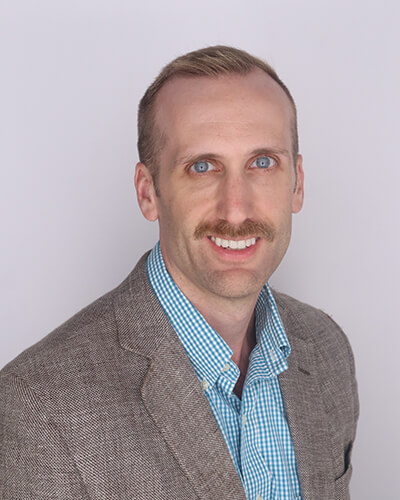
After a graduate school stint at the U.S. Environmental Protection Agency, Alex Carroll began his career as a science and engineering librarian at the University of Maryland in College Park before moving to North Carolina State University in Raleigh. A highlight of working at these land grant institutions was the opportunity to support their agricultural extension services, which entailed interacting with stakeholders throughout their respective regions.
The challenges of working as a STEM librarian at these public research universities were ones of scale and scope, he said. The large number of students and faculty he supported limited his ability to build relationships with researchers, and the degree programs’ narrower scope meant fewer opportunities to engage with curriculum across disciplines. Carroll was drawn to Vanderbilt, where he currently serves as associate director of the Sarah Shannon Stevenson Science and Engineering Library, by the opportunity to create targeted programs for smaller audiences, and to do so within a comprehensive residential campus community that houses experts from across the health sciences, engineering, law, business and the liberal arts.
How does your role contribute to the university’s cross-disciplinary research mission?
Our Science and Engineering Library team is one of the few within the Heard Libraries that intentionally supports more than one school or college, so we are, by design, always thinking across disciplines. We build our service models to be strategic enough that they address the needs of both scientists within the College of Arts and Science as well as engineers within the School of Engineering, but we also emphasize the importance of being responsive and flexible to identify emerging trends that we see within both main stakeholder groups.
Crucial to our success is how we’ve designed our liaison librarian service, which we call the team-based model. Rather than using single department assignments, our team of liaison librarians supports all our departments collectively. This helps us identify trends in the teaching mission or the research enterprise that are cutting across disciplines and positions us to develop library services that can address those needs. I suspect that the forthcoming College of Connected Computing, which university leadership has envisioned as being intentionally transdisciplinary in terms of faculty appointments, will reinforce the importance of having librarians who can work across departments to connect with students and researchers from multiple fields.
What’s a unique aspect of the Heard Libraries’ culture that helps you succeed in your role?
One of my favorite things that I’ve had the privilege of doing here is chairing the Teaching and Learning Committee. What leading that group for several years reinforced for me was just how impressive the breadth and depth of expertise are across the Vanderbilt University libraries. When I find myself at my wits’ end trying to solve an inquiry from a scientist or an engineer, I can always count on a colleague from the Massey Law Library, the Walker Management Library or the Eskind Biomedical Library to have a good resource recommendation to share. It always feels like magic when I can share a detailed market research report out of Walker’s collections or a detailed pharmacological compound profile from reference material out of Eskind’s collections.
Of course, having colleagues who have curated robust collections is key—but not the only thing—to making this sort of magic happen for our researchers. Knowledge sharing can only happen within a library where the staff are generous enough to share their time and expertise with one another as well. I’m grateful that the Heard Libraries have fostered a culture of abundance rather than scarcity, where we prioritize collaboration with one another and celebrating our successes collectively.
What are you looking forward to—professionally or personally—in the new year?
I’ve got a book coming out, Essentials of STEM Librarianship, that I wrote with my colleague Joshua Borycz, set to be published by ALA Editions in summer 2025. While it discusses the technical aspects of STEM librarianship that we think are important, most of the book is focused on the value of fostering and maintaining relationships with the people who make up STEM departments in colleges and universities. One of the things I’ve come to appreciate about the success of our liaison librarian program is that we’re really in the business of building relationships with our stakeholders. Before we can help solve the problems researchers are encountering in their workflows or students are bumping up against in their coursework, these members of our community need to know who we are and how we can help them.
The idea of building relationships will be top of mind for me throughout 2025. My colleague Honora Eskridge and I will offer a webinar for the Association of College and Research Libraries this spring titled “Creating the Relational Liaison: Preparing Librarians for Relationship Management and Stakeholder Engagement,” during which we’ll reflect on many of these same ideas and how they are important beyond just STEM libraries. Finally, I’m looking forward to building relationships with the executive leadership of the College of Connected Computing as it comes online over the next year. The Science and Engineering Library will be leading the Heard Libraries’ support of this college.
On a personal note, I’m excited about the birth of my third child, who is set to join us at the end of December. I’m looking forward to spending some time in early 2025 at home with him and soaking in all the joyful chaos that being a family of five will entail.